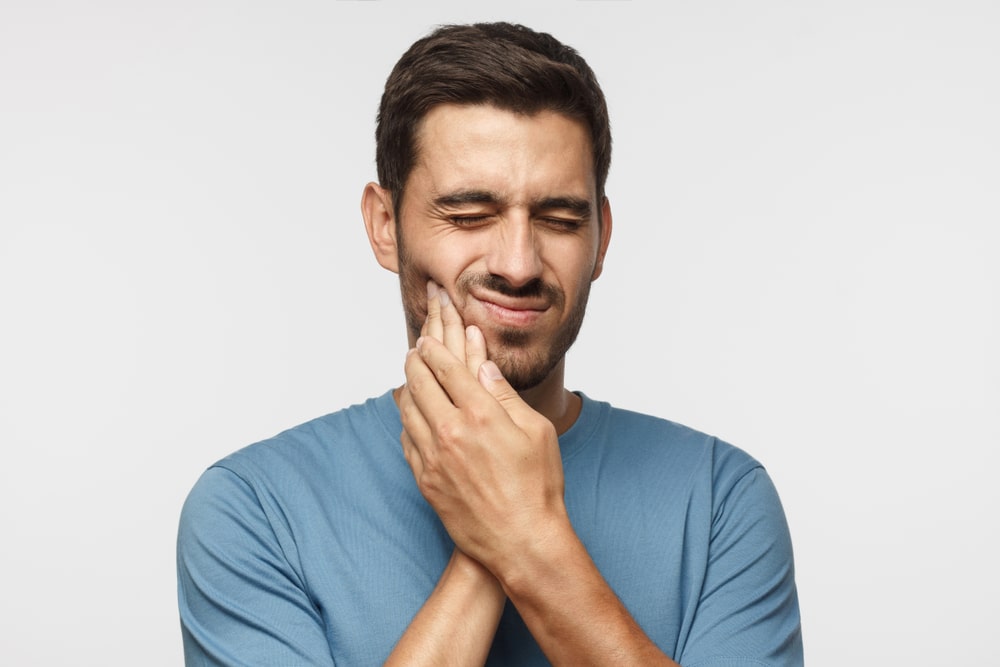Emergency Dentistry
overview
Dental Excellence in a Down-to-Earth Atmosphere
“Dental emergency” can mean many things. It could mean a painful infection that occurred due to a lack of proper oral hygiene. Or it could mean a tooth that has been knocked out of the mouth by an accident. It can even refer to the loss of a filling or crown that leaves the tooth exposed to further damage. Whatever your emergency is, you should call River Bend Dental to set up an appointment right away so that Dr. Bonds can help with emergency dentistry in Plano, TX.

Why Choose River Bend Dental for Emergency Dentistry?
- SAME-DAY EMERGENCY APPOINTMENTS
- MULTIPLE OPTIONS FOR DENTAL SEDATION
- GENTLE, FRIENDLY DENTIST AND TEAM
How We Treat Dental Emergencies
- Same-Day Appointment: We highly recommend that you keep our number on your phone so you can call our dental office as soon as you realize something is wrong. A team member will give you advice on how you can stay comfortable and protect your smile at home before scheduling a same-day emergency appointment.
- Comprehensive Exam: There are two main goals of the initial emergency examination. The first is to put a stop to any severe, immediate pain. The second is to figure out what the cause of the emergency is by examining the mouth and taking X-rays.
- Review Findings: We will go over the treatments available for your specific dental emergency, and we’ll explain the costs and timeline you can expect to see with the given treatment.
- Get the Care You Need: Root canal therapy, dental crown placement, and/or other procedures are performed to address the root of the emergency and get your oral health back to normal.
The Most Common Dental Emergencies
Are you not sure whether you have a dental emergency or not? Below are some of the most common dental issues that generally require urgent care. If you still have doubts, call our dental office right away and tell our team about what symptoms you’re experiencing; they can help you figure out whether or not you need immediate care.
Is My Toothache a Dental Emergency? Despite popular belief, toothaches should not be ignored. Even if it’s minor, you should call our Plano dental office if the pain persists for more than 24 hours. If the discomfort is severe, there is a pimple-like bump on your gums near the tooth, or you’re experiencing a sharp pain when biting down, then we may even recommend same-day treatment.
How You Should Handle a Toothache In addition to contacting our team to schedule an appointment, we recommend rinsing periodically with warm saltwater to help prevent an infection. You should also take an OTC pain reliever as instructed and avoid extremely crunchy foods, like tortilla chips and hard pretzels, since this can exacerbate your discomfort.
How We Treat Toothaches How we intervene will depend largely on the severity of the damage. While minor cavities can be treated with a tooth-colored filling, more serious cases of decay may require a dental crown or root canal therapy. As always, we will review all of the treatment options, as well as the associated costs, so you can make an informed decision.
Is a Chipped Tooth a Dental Emergency? Although a chipped tooth isn’t always a dental emergency, it is a dental injury that always warrants a call to our Plano dental office. Even if the chip is small, this will allow our team to examine the tooth, make sure it isn’t at risk of breaking further, or intervening with the right treatment if it is.
How You Should Handle a Chipped Tooth To help avoid the tooth from additional damage, we recommend rinsing with clean water periodically and covering the tooth with dental wax or sugar-free gum. Naturally, you should also avoid using that tooth to chew. Stick to soft-low sugar foods, like oatmeal and scrambled eggs instead.
How We Treat Chipped Teeth Cosmetic dental bonding and veneers are two popular solutions for chipped teeth. The one that’s best for you will depend on a few factors, including the location of your tooth, the size of the chip, and your budget.
Are Very Sensitive Teeth a Dental Emergency? It’s possible! To determine if it is, we recommend assessing your situation. Has the pain persisted for more than 24 hours? Are your gums red, irritated, or swollen? Are you experiencing pain when biting down? If you answered “yes,” then you should schedule an appointment with our Plano emergency dentist ASAP.
How You Should Handle Very Sensitive Teeth First, you can try switching to a desensitizing toothpaste to see if that helps. If the discomfort persists, then do what you can to minimize your sensitivity, like not drinking hot or cold beverages.
How We Treat Very Sensitive Teeth While one patient’s teeth may naturally be prone to sensitivity, the next might be struggling with advanced gum disease. That’s why we begin every emergency appointment with a thorough oral exam and X-rays. Then, we will determine what the source of the problem is and how to best intervene.
Is a Lost Filling or Crown a Dental Emergency? If one of your restorations came loose – like a filling, crown, or even a veneer – then you should absolutely call our Plano dental office as soon as you can.
How You Should Handle a Lost Filling or Crown There are three main steps: scheduling an appointment for treatment, storing your restoration in a small, clean container for safekeeping, and protecting your tooth in the meantime. The last step can be done with a few simple measures, like rinsing your mouth with water and not chewing on that side of your mouth.
How We Treat Lost Fillings or Crowns If your restoration came off, providing you with a new one is always an option. For dental crowns that are in good condition, there is also another option: re-cementing them back in place.
Is My Broken Denture a Dental Emergency? Yes. After all, your dentures play a crucial role in day-to-day life, like helping you chew efficiently. If they are broken, then your diet as well as your confidence and oral health can be negatively impacted. So, give our Plano dental team a call ASAP – we’ll help you find a solution.
How You Should Handle a Broken Denture Whether a small part of your denture broke off or your restoration is completely split in two, we recommend storing the pieces in a clean container so they don’t sustain further damage.
How We Treat Broken Dentures There are some cases where we can restore your denture, which is usually possible when the damage is relatively minor. However, we also have the option to replace your old one with new traditional dentures or implant dentures!
Is a Loose Permanent Tooth a Dental Emergency? If one of your teeth feels loose, then you should call our Plano dental office immediately. We need to intervene before the tooth completely falls out!
How You Should Handle Loose Permanent Teeth First, don’t wiggle the loose tooth with your tongue or finger. Second, don’t chew anything crunchy, hard, or sticky. Third, use clean, room-temperature water to rinse your mouth periodically.
How We Treat Loose Permanent Teeth If we can use a dental splint to save your tooth, then we will. Sometimes, however, it’s better to gently extract it and use a dental implant to fill the new gap in your smile.
Is an Injury to the Gums, Lips, or Tongue a Dental Emergency? Since these injuries can usually be handled at home, the answer is “no.” The one exception is if the cut has been bleeding for more than 10 minutes. In that case, you should seek medical attention.
How You Should Handle an Injury to the Gums, Lips, or Tongue To clean the wound and get a better idea of how large it is, first use some clean water to rinse your mouth. Then, dampen a washcloth and use it to apply pressure to the area. Within 10 minutes, the bleeding should subside. At this point, you can use a cold compress to soothe irritation and alleviate swelling.
How We Treat Injuries to the Gums, Lips, or Tongue There are some cases where we can provide stitches. However, if the cut is large enough that it results in uncontrollable bleeding, then you should head to the ER.
Is Jaw Pain a Dental Emergency? Since jaw pain could be the result of a serious oral health problem, it definitely shouldn’t be ignored. We typically recommend that patients schedule an appointment with us if their discomfort has persisted for more than 24 hours.
How You Should Handle Jaw Pain Taking OTC pain medication, using a cold compress, and sticking to soft foods are a few ways you can help alleviate your discomfort from home.
How We Treat Jaw Pain First, we will take X-rays and conduct an exam. This will help us determine what’s causing your jaw pain (i.e., chronic teeth grinding, TMJ dysfunction, impacted wisdom teeth) and, in turn, what the best course of action is to alleviate it.
If a piece of food is firmly lodged between your teeth, don’t reach for a toothpick or tweezers. Instead, combine some salt in warm water and mix the solution around in your mouth for 30 seconds at a time. This should help loosen the debris so you can successfully remove it when flossing. Of course, if this doesn’t work, then you can also call our Plano dental team. In addition to providing you with tips, we can schedule a time for you to come into our office so we can remove it.
Keys to Preventing Dental Emergencies
Dental emergencies are never convenient. On the contrary, they are often stressful and painful. So, naturally, you want to reduce your chances of experiencing one however you can. The good news is that there are several best practices you can implement to help! To learn what they are, read on.
Your biannual visits with your dentist are broken up into two sections: the checkup and the cleaning. During the checkup, we examine the condition of your teeth and gums, paying special attention to anything that could result in a dental injury down the line. The cleaning portion is also essential because it allows our Plano dental team to remove stubborn plaque and tartar that could’ve otherwise resulted in tooth decay or gum disease. So, if it’s been more than six months since your last appointment, schedule yours today!
Naturally, how you take care of your teeth on a daily basis matters as well. Neglecting good oral hygiene best practices can result in large cavities that could leave you vulnerable to chronic tooth pain, painful fractures, and the like. That’s why it’s crucial to brush twice a day, floss daily, and rinse with mouthwash regularly.
Simply put, what you eat impacts your oral health. If you fill your plate with foods that are loaded with sugar and lacking in nutrients, then you’re at an increased risk for developing cavities. On the contrary, if you fill your plate with healthy carbs, cooked vegetables, fresh fruit, lean proteins, and other vitamin-rich foods, then you will help keep your teeth healthy from the inside out.
Sports-related injuries, like knocked-out teeth, are some of the most common dental emergencies. Therefore, you should always wear a mouthguard during practices and games. This will protect your teeth from unforeseen incidents, like a rogue ball flying toward your mouth. Even better, custom-made mouthguards from your dentist will fit your teeth perfectly and can be adjusted as needed for the sport you participate in (like boxing vs. basketball).
Using your teeth to open something may seem convenient in the moment, but the damage it can cause is quite the opposite. In addition to introducing bacteria to your mouth, the pressure from opening a bag or package can result in a cracked, loose, or fractured tooth. Needless to say, it’s worth locating and using scissors instead.

Understanding the Cost of Emergency Dentistry
Once you’ve arrived at our office and we’ve restored your pain-free smile, you might wonder, “How much will this cost?” It’s very normal for patients to be curious about the price tag associated with their treatment. Fortunately, our knowledgeable and friendly team is here to help make navigating the financial side of your treatment smooth as well. To learn more about factors that impact the cost of emergency dentistry in Plano, read on!
The complexity of a dental emergency is one of the biggest factors in determining how much it will cost to treat. A small cavity that only needs a filling is less expensive to address than an infection that has already completely killed off the pulp within the tooth. We’ll only recommend the most ideal treatment for your situation, and we’ll be upfront about why you need it and how much you can expect to pay for it.
Do you have dental insurance? Good news: your benefits may cover a portion of the cost of your emergency visit! While some patients will receive 50% to 80% off the cost of essential restorative care, others can expect a complimentary emergency exam. That’s why it’s a good idea to double-check the fine print on your dental plan. Since we are in-network with Cigna and welcome many other dental insurance providers, we can help file the paperwork and maximize your benefits, making the process significantly easier.
Don’t have dental insurance? Fortunately, we have another solution: CareCredit. As a trusted third-party financier, they offer payment plans so patients don’t have to pay for the entire cost of their treatment upfront. There are also low-to-no interest options available for qualified patients!
Before wrapping up the cost section, it’s important to discuss how taking care of your smile can help save you money. Good oral hygiene best practices like brushing twice a day and avoiding unhealthy dental habits, such as smoking, can go a long way in preventing dental injuries. Biannual checkups and cleanings are a crucial part of this as well. So, if it’s been more than six months since your last visit, don’t wait – schedule yours today!

Dental Emergency FAQs
Are you dealing with a toothache, lost restoration, cracked tooth, or damaged dental work? Each of these conditions constitutes a dental emergency and requires immediate attention.
Dental emergencies can be a stressful time for any patient. Call us today, and everyone here at River Bend Dental of Plano will help make the process much easier!
If you want to learn more before then, here are some of the most common questions that people have about dental emergencies.
Toothaches can occur for a wide variety of reasons. Your tooth may hurt due to injury or decay, but some of the most severe kinds of tooth pain come from an infection that has entered the tooth.
If a toothache feels like a persistent throbbing coming from within the tooth, that could be a sign of infection. You should also take note of any of the other common signs of infection, like bad breath, swollen gums, or a sore around the tooth that’s aching.
While these signs are important to notice, the only way to know the cause of your discomfort definitively is to talk to a professional. We’ll also be able to quickly and comfortably treat any infections we find, so don’t hesitate to give us a call if you’re worried!
Dentists are specialists in all things related to the teeth, and have a set of tools and skills that emergency room doctors do not. If you’re dealing with a cracked tooth or oral abscess, there unfortunately isn’t going to be much that the ER can do for you.
The exceptions to that rule are situations where the injury is severe, making the situation so pressing that you need to be stabilized immediately. A broken jaw or serious cuts to the mouth are good examples, as is swelling that has advanced to such an extent that it becomes difficult to breathe. The ER can also be useful in relieving severe pain until you can make it to your emergency appointment.
Otherwise, your priority should be getting to our office as quickly as possible. We’ll be able to give you the care you need to get your smile back to perfection.
You may have noticed denture repair kits at your local pharmacy, but the fact is that there’s no real way to repair a denture that has been broken in half on your own. If your dentures have snapped, that’s a dental emergency that will require our attention.
If you have a set of spares feel free to wear them until we can see you. Otherwise, don’t try and fix your dentures on your own—it’s likely that’ll just make the actual repairs harder.
If you can’t make it to our office until tomorrow, you should still try and get a good night’s sleep. However, that is much easier said than done when you’re in pain.
If you’re dealing with a toothache, you may notice that it gets worse just before bed. That often has to do with an increase in blood flow to the head when you lay down, so you should try to keep your head elevated as you sleep when you’re dealing with a toothache.
You should also make use of OTC pain medication according to the instructions on the bottle, and take care not to eat anything hot or chewy before bed that could irritate your tooth. Finally, try using a cold compress to bring down any swelling that could be bothering you.

